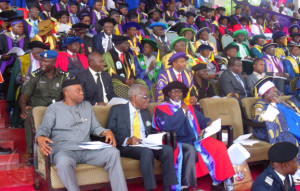Category Archives: Education

The Headies Awards 2013 Full List Of Winners
The Headies Awards 2013 was held on boxing day 2013 at the Grand Ball room of Oriental Hotel, Lagos and was hosted by Mavin Records acts Tiwa Savage and Dr SID.
Big winners of the night include Olamide, Phyno, Waje, Clarence Peters and Davido who bagged multiple awards. The night also features performances from Iyanya, Sean Tizzle, Seyi Shay, Praiz and much more.
In addition, Fuji Artist was inducted into the Headies Hall Of Fame.
Check out the full list of winners for the night.

ASUU strike: Union members in Ondo State universities return to work
The three universities in Ondo State on Monday resumed normal academic activities in compliance with the Federal Government’s directives.
Mr Adebanjo Adegbenro, Public Relations Officer (PRO) of the Federal University of Technology, Akure (FUTA), told the News Agency of Nigeria (NAN) that it had complied with government’s directive to university lecturers.
According to him, the institution has resumed since last week and everything has been put in place to ensure that normal academic activities resume this week.

ASUU strike: FG confirms payment of N200bn, shifts resumption deadline to December 9
Federal Government Tuesday confirmed that the N200b it promised the nation’s Universities has already been deposited in an account with the Central Bank of Nigeria.
The Senior Special Assistant to the President on Public Affairs, Dr. Doyin Okupe and the Executive Secretary of the National Universities Commission, Prof. Julius Okojie, disclosed this separately on Tuesday.
The amount has been approved to develop infrastructures in the nation’s public universities.

ASUU strike: AAUA begins recruitment to replace striking lecturers
The academic war between Management of Adekunle Ajasin University, Akungba-Akoko [AAUA] in Ondo State and its striking lecturers has deepened following a report that the Vice-Chancellor of the institution, Prof. Femi Mimiko has commenced recruitment of new lecturers to replace the striking lecturers, having refused to pull out of the ongoing Academic Staff Union of Universities’ [ASUU] strike.

ASUU strike: Protest may be suspended within 24 hours
The Academic Staff Union of Universities on Wednesday put the weight of the ongoing strike on the Federal government as it said that the university strike would be called off 24 hours after the federal government accepts the new resolutions reached with President Goodluck Jonathan on November 4.
Recall that the Union had conducted a referendum late last week, where 60 per cent of the lecturers voted for the re-opening of the shut schools.
Relatively, in a swift reaction to a statement credited to the Education Minister , Nyesom Wike, the Union said that Wike’s assertion that ASUU was making new outrageous demands was “untrue and absolute lie.”

ASUU Strike: Adekunle Ajasin University announces resumption date
Akure — Adekunle Ajasin University, Akungba-Akoko chapter in Ondo State have ordered students to resume their studies on Monday, despite the continuing lecturers strike.
According to Vanguard, the Registrar of the university, R. B. Olotu, in a statement gave the resumption date for students for the second semester of the 2012/2013 session as 25 November.
Reacting to the resumption date declared by the university authorities, the Academic Staff Universities Union (ASUU) Chapter of the university have told lecturers to ignore the directive.
The Vice Chancellor of the University, Professor Femi Mimiko, had earlier warned that he will recall students if the strike was not suspended.

ASUU strike: Again, government appeals to Union to end strike
After having waited endlessly for the Academic Staff Union of Universities, ASUU, to end its ongoing strike over the non-implementation of the 2009 agreement it entered with the government, the Federal Government on Saturday, again, appealed to the protesting lecturers to call off its over four months strike, for the interest of the nation.
The Minister of Finance, Dr. Ngozi Okonjo-Iweala, made the appeal on behalf of the government at the Oduduwa University, Ipetumodu. The appeal came while she was speaking with journalists after she was been conferred with an Honorary Doctorate Degree in Accounting by the University.
Nkwo Nelson: ASUP strike – the sheer neglect of Polytechnic education
It is a general knowledge that education is the bedrock of growth and development of any nation. Its role to overall national development cannot be overemphasized. In fact, it is a sinequanom for the achievement of sustainable cum significant magnitude of development in a country.
Technical education is a subsector of the educational sector which is designed to impart knowledge and necessary skills in order to provide competent and well-skilled manpower for industrial and technological development. It is structured to be technical, scientific, educational, practical, and research-oriented. Rapid increase in technological advancement around the globe has accentuated the indispensability of technical education. It is basically on this note that the then colonial masters established the polytechnics with the objective of training and provision of the manpower requirement for industrial and technological development and the execution of the nation’s development plan, goal and objectives.
Apparently, the managements of the polytechnics have been striving tirelessly for the achievement of the objective for the establishment of the institutions. Most federal and few other state polytechnics, through the infinitesimal amount they receive from the TETFund (Tertiary Education Trust Fund) as well as their IGR, has ensured the provision of the facilities and other equipments that will help to foster students’ practical knowledge and skills in order to inculcate the desired practical knowledge in them. In addition, most of these polytechnics drafted policies that will enable them maintain good academic standard, good examination conduct, effective lecture delivery pattern, setting up of monitoring group on both students and lecturers in order to combat corruption in the institutions. Their curriculum, as designed by the NBTE, is structured to impart appropriate and adequate knowledge to their students without being behind their university counterparts. This is made evident in the product of the polytechnics who find their way into the public service or the industries through exhibiting sui generis skills and contributing immensely to productivity.
Furthermore, significant comprehension of the dynamic realities of the labour markets prior to graduation is very pertinent as this will reduce wastages occurring as a result of incompetency and poor knowledge of the industry, increase efficiency of employee, make for easy adaptation and increase productivity. Therefore, the managements of the polytechnics incorporated in their scheme a compulsory twice Industrial Training (IT) programme for their students. A four-month IT after their ND1 and another one year IT at the conclusion of their national Diploma which will then serve as a mandatory prerequisite for their admission into Higher National Diploma (HND) programme. These IT programmes expose their students to a better understanding of the ever changing industrial environment (or the real world) as well as its intrinsic challenges and prepare them to fit into this world after their graduation.
Unfortunately, irrespective of the undisputable importance of this subsector of the educational sector to national development, polytechnic education has faced one major perennial challenge which has breed other challenges bedeviling its development. This major problem is the unmitigated neglect on the polytechnic education by both the government and private industries. This was made evident by government’s flippancy to developing the subsector as well as its inability to give attentions to issues affecting them (the polytechnics). It has concentrated its attention to the development of its only recognized institution in the country (the university) making polytechnics nothing but glorified secondary schools. This challenge has culminated to several other problems of which the interminable discrimination between HND holders (polytechnic graduates) and Bsc holders (university graduates) is the most disheartening. This issue has lingered since the inception of polytechnics in Nigeria. Myriads of articles have been written by concerned citizens to sensitize the government and the entire public on its adverse effect on economic development as well as the need to end it. Yet, nothing significant has been done to bring it to an end.
This appalling dichotomy is so open that it is exhibited by both public and private sector. In the public/civil service, career progression of HND holders is limited before they could get to the highest grade level even though they were found more competent than their Bsc counterparts. Specifically, promotion of HND holders stops at level 14 whereas Bsc holders continue to level 17. This makes it possible for a Bsc holder to be promoted above a HND holder who has spent 5 years or more before the Bsc holder was employed. So unfair! Other forms of discrimination meted against HND holders are in the areas of inequality in salary grade level and also in the security agencies where Bsc holders are commissioned whereas HND holders are non-commissioned.
As a result of this stigmatization against polytechnic graduates, polytechnics, therefore, do not give the psychological satisfaction of being a graduate or under-graduate. Consequently, hardly would you see a student seeking admission into high institution who applies to a polytechnic since he already have knowledge of the fact that he will be rated below his university counterparts. Admittedly tough, there are university graduates who are better than polytechnic graduates, yet, there are also polytechnic graduates who are far better than university graduates. Agreeably, then, polytechnic students are by no means academically or mentally inferior to their university counterparts. What then is the justification for the marginalization and disdainful treatment on polytechnic graduates and under-graduates?
In addition, polytechnic subsector has not gotten adequate funding from the government. According to Chibuzor Asomugha, ASUP National President, the government budgetary provision for the polytechnic sector are not only a deep reflection of the deep neglect of the sector but the embarrassing extent to which it has continued to misplace proprieties in the quest for technological development. In 2012 budget where over N400 billion was allocated to the entire education sector, Asomugha said that the government was biased in the allocation. According to him, federal polytechnics got N63.7 billion, representing 15.92 percent, while federal colleges of education got N42.5 billion which represented 10.62 percent. But federal universities got N188.4 billion representing 47.10 percent, an indication that the university sector alone received almost twice what was allocated to the polytechnics and colleges of education. What a shame!
Also, this flippancy and lack of commitment by the federal government on polytechnic education can be said to be the reason why ASUP strike has lingered. Recall that the Academic Staff Union of the Polytechnics (ASUP) embarked on an indefinite strike on the 29th of April, 2013 which lasted for 81days which paralyzed academic activities as well as disrupted academic calendar of the institutions. Interventions were made by the Joint Senate and House Committee on Education and several appeals were also made by other concerned bodies which lead to the suspension of the strike. The leaders of the union stated that the suspension was to enable the committee to liaise with relevant agencies and ministries with a view to tackling all issue contained in the unions demand within a time frame of one month. Unfortunately, FG and the committee did not fulfill their promise to the union after one month and they resumed their indefinite strike on the 4th of October, 2013. The demands of striking union, among others, are the need for the constitution of governing councils for the polytechnics, non-release of white paper on the visitation panels to federal government, commencement of NEEDS assessment of the polytechnic, continuous appointment of unqualified persons as rectors and provost by some state government, failure of government to implement the approved salary package(CONPCASS), 65-year retirement age for the members, the worrisome state of State owned polytechnics, the continued recognition of the National Board of Technical Education as the regulatory body of the Nigerian polytechnics as against the unions repeated call for the establishment of National Polytechnic Commission(NPC), the non commencement of the re-negotiation of the FGN/ASUP agreement as contained in the signed agreement, the snail speed on works on the amendment of the federal polytechnic Act/scheme of service and migration of the lower cadre to CONTISS salary scale. Every sagacious human being could believe that the agitations of this union is not based on selfishness but centered on the development of the polytechnic education. As a result of this strike action, students have been forced to stay at home jobless with their parents, frustrated and spend all their time gazing at the screen of their television and making their mobile phones their best companion. Some who cannot withstand the frustration fall victim to one social vice or the other.
At this juncture, I appeal to the federal and state government as well as other bodies concerned to bring this malignant disdainful treatment on polytechnic education to an end. Continuous stigmatization against polytechnic graduates will only under-develop the subsector and increase pressure on university admission process as no one would desire to attend polytechnics. Recognition, commitment and adequate funding of this subsector will foster its development. Also, taking into cognizance of the effect of this endless ASUP strike on the future of the students and the polytechnics, I therefore beseech federal government to fulfill their promise to the union in order for them to call of the strike so that students and lecturers could return to classes.
Finally, No meaningful national development could be achieved by any nation without sound and qualitative technical education as asserted by Patrick Ajunwa. The question now is, “how would our country develop and fit into the global trend of technological advancement when it has failed to develop the technical education?” I, therefore, implore federal government; develop our polytechnics to develop our nation.
Nkwo Nelson,
HND1, Federal Polytechnic Nekede,
Owerri, Imo State

ASUU strike: Suspend it in honour of Iyayi – UNIBEN Board chairman tells Union
As the Academic Staff Union of Universities’ NEC meeting gets underway, the Pro-Chancellor and Chairman of the Governing Board of the University of Benin, Senator Bob Effiong, has appealed to the striking lecturers to go back to classrooms as a last respect to the late Professor Festus Iyayi who lost his life while struggling for the course of the Union.
Iyayi, a former Head of Business Administration Department of the University of Benin and former National President of ASUU was killed in an auto crash while on his way to attend ASUU National Executive Committee (NEC) meeting in Kano.
Effiong had expressed that the death of Iyayi was painful as he was unable to see to the end of what he was struggling to resolve; a strike he said had lasted for more than four months.
The Chairman had equally, in a condolence visit to Iyayi’s family yesterday called on the Union to institute an academic foundation in honour of Iyayi for his immeasurable contribution to the nation’s education sector.
“…it is expedient at this point for both the federal government and ASUU to come to an understanding in honour of this great patriot,” Effiong said .
The condolence message reads thus: “When we take into cognizance his immense contributions to ASUU in its quest to reposition Nigerian universities in the world and his role as a teacher and scholar, we know that the academia has lost a rare gem that would be difficult to replace.
“However, we want to console you to bear the loss with fortitude, resting in the knowledge that Professor Iyayi gave his life in the struggle to ensure a better and brighter future for the Nigerian child in terms of sound education.”

I signed a deal to replace Ferguson as coach of United” – Sven-Goran Eriksson
Former Manchester City manager, Sven-Goran Eriksson, has revealed in his new autobiography, that he signed a deal to become Sir Alex Ferguson’s successor at Manchester United in 2002.
Ferguson initially stated he was going to step down in 2002, before deciding to stay on till this year, when he was replaced by David Moyes. Eriksson claims that he held talks with United’s chiefs and accepted the offer.
In an extract from the book, reproduced in the Mail on Sunday, Eriksson wrote: “I knew it would be tricky. I had a contract with England until the 2006 World Cup and I would be severely criticised if I broke that contract.
“But this was an opportunity to manage Manchester United. A contract was signed – I was United’s new manager.”





















